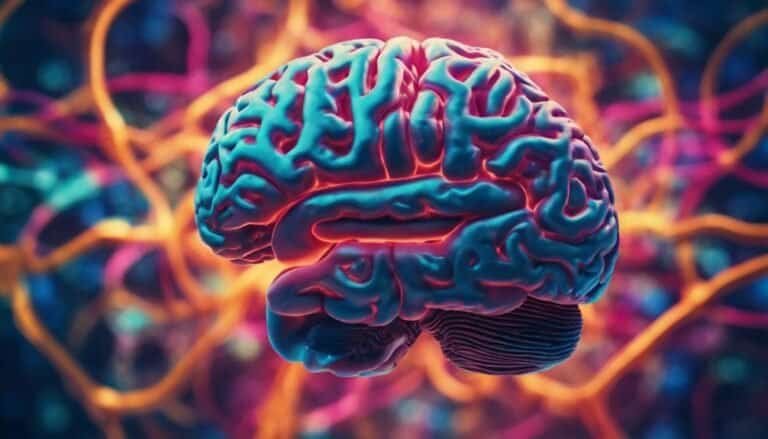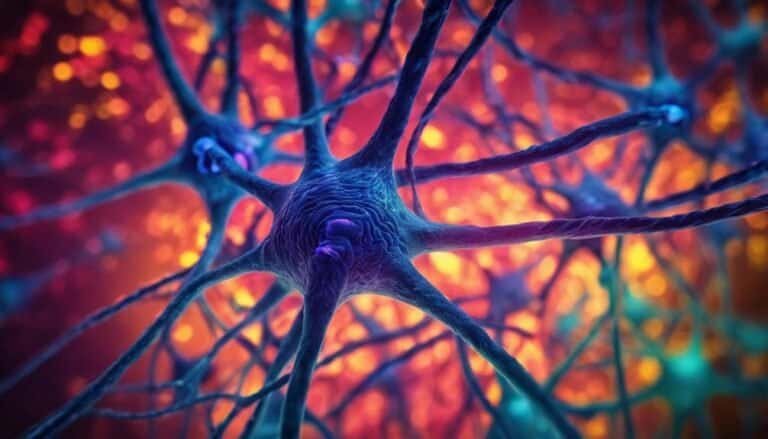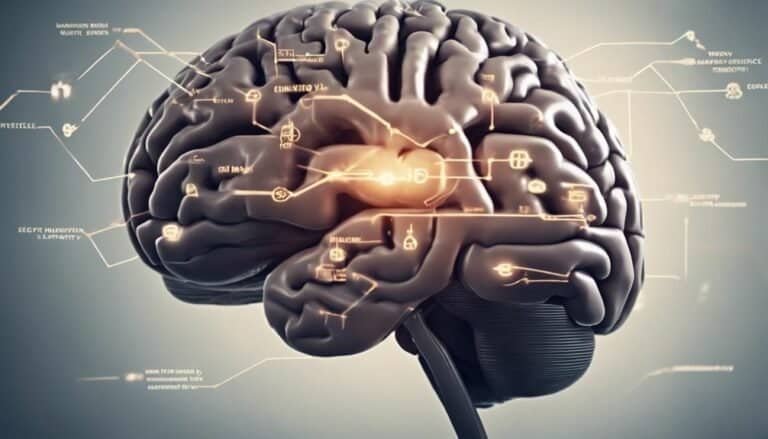Brain's Contribution to Self-Discipline
Imagine your brain as a conductor orchestrating a symphony of self-discipline. From neurotransmitters influencing your decisions to the prefrontal cortex reigning in impulsive behavior, your brain plays a crucial role in your ability to stay focused and on track.
But what happens when this symphony encounters disruptions or challenges? Understanding how your brain contributes to self-discipline can offer valuable insights into enhancing your willpower and achieving your goals.
Key Takeaways
- Neurotransmitters like dopamine and serotonin influence self-discipline through signal transmission.
- The prefrontal cortex regulates impulse control and decision-making processes.
- Dopamine's role in motivation modulates reward-related behaviors in the brain.
- Brain plasticity shapes behavior through neural adaptations, aiding in habit formation.
Neurotransmitters and Self-Discipline
Understanding how neurotransmitters influence self-discipline is crucial for unraveling the brain's role in this cognitive process. Neurotransmitter balance plays a significant role in regulating willpower and self-control. Within the intricate web of brain chemistry, these chemical messengers are responsible for transmitting signals between neurons, impacting various cognitive functions, including decision-making and impulse control.
Dopamine, a neurotransmitter associated with pleasure and reward, is closely linked to motivation and self-discipline. When dopamine levels are balanced, individuals tend to exhibit higher levels of willpower and are better able to resist immediate gratification in favor of long-term goals. Conversely, imbalances in dopamine levels can lead to impulsivity and reduced self-control.
Similarly, serotonin, another neurotransmitter, is essential for regulating mood and behavior. Low levels of serotonin have been linked to decreased impulse control and increased risk-taking behavior. By maintaining a healthy balance of neurotransmitters, particularly dopamine and serotonin, individuals can enhance their self-discipline and improve their ability to make decisions that align with their long-term goals.
Prefrontal Cortex and Impulse Control
The prefrontal cortex plays a pivotal role in regulating impulse control and decision-making processes in the brain. This region, located at the front of the brain, is crucial for higher cognitive functions. Decision making, a complex process involving selecting between different options based on their potential outcomes, heavily relies on the prefrontal cortex. This brain area integrates information from various sources and uses it to guide behavior towards a particular goal.
Cognitive control, another essential function associated with the prefrontal cortex, refers to the ability to regulate thoughts and actions. It involves managing impulses, maintaining focus, and adapting to changing environments. When it comes to impulse control, the prefrontal cortex plays a central role in inhibiting automatic responses and promoting more considered actions. By exerting cognitive control, this brain region helps individuals resist immediate temptations in favor of long-term benefits.
Dopamine's Role in Motivation
As the discussion shifts to dopamine's role in motivation, it becomes evident that this neurotransmitter plays a crucial part in modulating reward-related behaviors within the brain. Dopamine is a key player in the brain's reward circuitry, influencing how we perceive and seek out rewards.
Here is how dopamine impacts motivation regulation:
- Dopamine and Reward Seeking: Dopamine is involved in signaling the anticipation of rewards, motivating individuals to engage in activities that are associated with pleasure or positive outcomes.
- Dopamine and Goal-Directed Behavior: This neurotransmitter helps in focusing attention and energy towards achieving specific goals, driving individuals to work towards desired rewards.
- Dopamine Dysregulation and Motivation Disorders: Imbalances in dopamine levels can lead to motivational deficits or excessive reward-seeking behaviors, contributing to conditions like addiction or depression.
Understanding the intricate role of dopamine in motivation regulation sheds light on how our brain processes rewards and guides our behavior towards achieving goals.
Brain Plasticity and Habit Formation
Playing a fundamental role in shaping behavior, brain plasticity contributes significantly to the formation of habits through neural adaptations. When you engage in a specific behavior repeatedly, neural pathways in your brain are strengthened through a process called long-term potentiation. This process involves the increased efficiency of synaptic connections, allowing signals to travel more effectively along these pathways. As a result, the behavior becomes more automatic and ingrained, eventually transforming into a habit.
Through behavior modification, you can capitalize on brain plasticity to establish positive habits. By consistently performing a desired behavior, such as exercising regularly or practicing mindfulness, you can reinforce the associated neural pathways, making it easier for your brain to default to these behaviors in the future. In essence, the more you practice a behavior, the more it becomes wired into your brain, leading to lasting changes in your habits. Understanding the intricate relationship between brain plasticity and habit formation empowers you to proactively shape your behaviors and cultivate self-discipline.
Stress, Emotions, and Self-Regulation
Stress and emotions play a crucial role in your ability to regulate your behavior and exercise self-discipline. Emotional regulation is a key component in managing your responses to various situations, while stress management techniques can help you stay focused and make better decisions. Understanding how these factors influence your self-regulation can enhance your overall well-being and productivity.
- Emotional Regulation: Being aware of your emotions and learning how to effectively manage them can significantly impact your self-discipline. Emotions can either support or hinder your ability to control impulses and stay on track with your goals.
- Stress Management: Developing strategies to cope with stressors is essential for maintaining self-discipline. High levels of stress can lead to impulsive behavior and poor decision-making, making it harder to stick to your plans.
- Behavioral Responses: Your ability to regulate emotions and manage stress directly influences your behavioral responses. Enhancing these skills can empower you to exercise greater self-discipline in various aspects of your life.
Conclusion
In conclusion, your brain plays a crucial role in self-discipline by regulating neurotransmitters, controlling impulses through the prefrontal cortex, and motivating behavior with dopamine.
The brain's plasticity allows for habit formation, while stress and emotions impact self-regulation. Like a finely tuned machine, your brain orchestrates the complex dance of self-control, shaping your actions and decisions.
So next time you face a challenge, remember the power of your brain in guiding you towards success.







